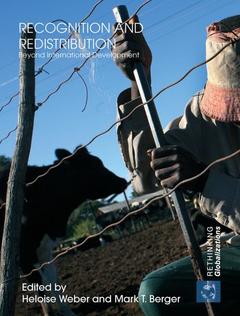Description
Recognition and Redistribution
Beyond International Development
Rethinking Globalizations Series
Coordinators: Weber Heloise, Berger Mark T.
Language: English
Subject for Recognition and Redistribution:
Keywords
Young Men; Cristina Rojas; CSR Initiative; Dia Da Costa; Failed State Concept; Dieter Plehwe; Jennifer Bair; Alternative Analytical Lens; Kathleen M; Jennings; African Economic Research Consortium; Marcus Taylor; Human Suffering; Mark T; Berger; Post-crisis Regimes; Martin Weber; War Ii; Social Reproduction; Philip Mcmichael; NIEO Agendum; Sandra Halperin; Civil Society; Shelley Feldman; Dubai Ports World; Susanne Soederberg; Incorporating Comparison; political theory; PRSP Initiative; political constellations; MacPherson’s Argument; methodological territorialism; IG Metall; contemporary development strategies; National Security Strategy; social theory; Capitalist Global Social Relations; Socio-economic Development; Colombian Pacific Region; Potential Drop; Atlas Economic Research Foundation; Quadrennial Defense Review; ECOMOG Intervention
Publication date: 12-2013
Support: Print on demand
Publication date: 10-2008
· 18.9x24.6 cm · Hardback
Description
/li>Contents
/li>Readership
/li>Biography
/li>
This is an innovative and insightful approach to the global politics of development. The authors challenge conventional perspectives of, and approaches to, development and offer alternative accounts of the politics of development from the perspective of non-state centred and non-state centric approaches. The authors offer critical reinterpretations of historical experiences of development processes and together with insightful analysis of contemporary development strategies this is a genuinely new perspective on the global politics of development. Moreover, in moving beyond more ?economistic? approaches to development this book seeks to uncover the complexity of development in ways that account for social relations of power and identity. The authors successfully demonstrate the transdisciplinary nature of the politics of development in their respective engagement with political theory, anthropological and sociological perspectives in ways that provide an overall integrated approach to the politics of recognition and redistribution in development. In contrast to globalisation calling into question the idea and practices of international development, this study situates the question of the politics of the ?international? within a broader historical context of global social relations of power and dispossession, and their impact on states, regions and cultures. In framing the project as whole through the concepts of recognition and redistribution, this is a genuine effort to ?rethink development?. It is timely in an era of global politics and globalisation wherein both issues of identity and struggles over development challenge us to re-rethink disciplinary boundaries.
- Introduction: Beyond International DevelopmentMark T. Berger and Heloise Weber
- Keeping the World Safe for Primary Colors: Area Studies, Development Studies, International Studies, and the Vicissitudes of Nation-BuildingMark T. Berger
- Social Regulation in the Time of War: Constituting the Current CrisisShelley Feldman
- On the Critique of the Subject of Development: Beyond Proprietary and Methodological IndividualismMartin Weber
- 'Failed States' and 'State Failure': Threats or Opportunities?Morten Boas and Kathleen M. Jennings
- From the Politics of Development to the Challenges of GlobalizationJennifer Bair
- Taming Corporations or Buttressing Market-Led Development? A Critical Assessment of the Global CompactSusanne Soederberg
- A Global Knowledge Bank? The World Bank and Bottom-Up Efforts to Reinforce Neoliberal Development Perspectives in the Post-Washington Consensus EraDieter Plehwe
- Rethinking the Global Production of Uneven Development Marcus Taylor
- Re-Envisioning Global Development: Conceptual and Methodological IssuesSandra Halperin
- A Political Analysis of the Formal Comparative Method: Historicizing the Globalization and Development DebateHeloise Weber
- International Political Economy/Development OtherwiseCristina Rojas
- The Poverty of the Global OrderDia Da Costa and Philip Mcmichael
- Conclusion: Towards Recognition and Redistribution in Global PoliticsHeloise Weber and Mark T. Berger
Heloise Weber is Lecturer in International Relations and Development, School of Political Science and International Relations, University of Queensland.
Mark T. Berger teaches in the Department of Defense Analysis at the Naval Postgraduate School (Monterey, California).




